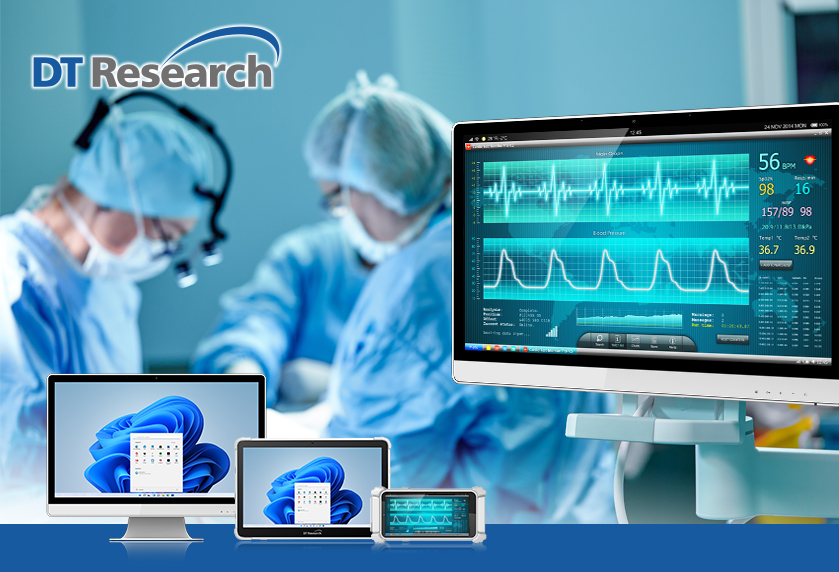
In the fast-paced world of emergency services, first responders need reliable, efficient, and versatile tools to provide the best possible care. Among these essential tools are medical tablets and medical cart computers. These health-focused computers have revolutionized the way emergency medical teams operate, offering unparalleled flexibility, functionality, and efficiency. This blog will explore how these technologies enhance the capabilities of first responders and emergency services, with a particular focus on their hot-swappable batteries, flexible usage, and compact design.
Medical Tablets and Cart Computers Shared Benefits
Medical tablets and cart computers share a number of key features that deliver ease of use and make them ideal for healthcare settings.
Medical tablets have become indispensable for first responders due to their portability, advanced features, and robust performance in various environments.
- Hot-swappable batteries for 24/7 Operation
One of the standout features of medical tablets and all-in-one cart computers is the hot-swappable battery system. This allows first responders and medical providers to replace batteries without shutting down the system, ensuring continuous operation. In critical situations where every second counts, the ability to keep a tablet and cart computer running 24/7 is invaluable. This feature ensures that patient documentation and hospital communication are uninterrupted, providing seamless transitions from the field to the emergency room.
- Versatility in Many Environments
Medical tablets and cart computers are designed to be used both inside and outside of buildings, as well as in-field applications. This versatility is crucial for first responders who often need to move quickly between different environments and when medical stations need to be set up in public spaces. Whether documenting patient information in an ambulance, consulting with specialists via telemedicine, or navigating challenging outdoor conditions, medical tablets and cart computers are built to withstand the demands of the job.
- Enhanced Patient Documentation and Management
In the chaotic environment of an emergency, accurate and timely patient documentation is vital. Medical tablets enable first responders to track and manage patient information from the moment they arrive at the scene until the patient is handed over to the ER staff. Once inside, the medical cart computer can be moved from patient to OR to recovery room. This continuous documentation improves patient care, ensures accurate medical records, and facilitates better communication between field personnel and hospital staff.
- Telemedicine Capabilities
Medical tablets and cart computers come equipped with built-in cameras and can connect to additional cameras, enabling telemedicine consultations. This feature allows EMTs and first responders to consult with specialists in real-time, guiding them through complex medical procedures and improving patient outcomes. Telemedicine can be a game-changer in situations where specialist input is required immediately, but not physically available.
Medical Tablets: A Lifeline for First Responders
- Improved Billing and Faster Payments
Accurate and prompt billing is crucial for the financial sustainability of emergency services. Medical tablets streamline the billing process by allowing first responders to input data accurately and efficiently from the ambulance, reducing errors and speeding up payment processes. This not only ensures that services are compensated promptly but also reduces administrative burdens on emergency departments.
- Slimmer, Streamlined Design
The design of medical tablets is focused on being slim and streamlined. This smaller footprint means that whether on a slim cart or put on mount cradle or a surface, medical tablets take up less space, making them ideal for crowded emergency rooms or tight patient recovery areas. The enhanced mobility ensures that these medical tablets can be quickly moved to anywhere they are needed most.
Medical Cart Computers: Enhancing Mobility and Efficiency in Emergency Departments
Medical cart computers, another vital tool in the arsenal of emergency services, offering unique advantages that complement those of medical tablets.
- No Need for Large, Heavy Cart Batteries
Traditional medical carts often require large, heavy batteries, making them cumbersome and difficult to maneuver. Modern medical cart computers eliminate this need, using hot-swappable batteries. This makes the actual carts lighter, more agile, and easier to move around, enhancing mobility and reducing physical strain on healthcare workers. Carts are not left out of commission in the corner to charge but can be used continuously with charged batteries always ready to swap in on the medical cart computer.
- Large, High-Resolution Screens
Medical cart computers typically feature large screens ranging from 22 to 27 inches. These high-resolution displays are perfect for viewing detailed graphics, using split-screen functionality, or even accommodating double screens on one cart. This capability allows healthcare professionals to access and analyze patient data more efficiently, improving decision-making and patient care.
- Flexible Deployment Across Various Hospital Areas
One of the primary advantages of medical cart computers is their flexibility. They can be moved as needed into patient rooms, emergency rooms, patient recovery areas, pharmacies, or lobbies for self-check-in and prescription pickup information. This adaptability ensures that vital computing resources are always available wherever they are needed most, enhancing overall workflow and patient service.
The integration of medical tablets and medical cart computers into emergency services has significantly enhanced the capabilities of first responders and healthcare professionals. These reliable healthcare computers, with their hot-swappable batteries, versatile usage, and streamlined designs, provide continuous, reliable support in critical situations. By improving patient documentation, enabling real-time specialist consultations, enhancing billing accuracy, and increasing mobility within healthcare facilities, these technologies play a crucial role in delivering high-quality emergency care.
As technology continues to advance, we can expect even more innovative solutions to emerge, further empowering emergency services to save lives and improve patient outcomes. The on-going evolution of medical tablets and medical cart computers will undoubtedly remain at the forefront of these advancements, ensuring that first responders and healthcare professionals are always equipped with the best tools available.

